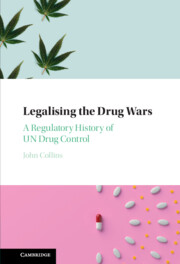Book contents
- Legalising the Drug Wars
- Legalising the Drug Wars
- Copyright page
- Dedication
- Contents
- Acknowledgements
- Abbreviations
- Historical Overview: The International Drug Control System
- Introduction
- 1 Drug Diplomacy from the Opium Wars through the League of Nations, 1839–1939
- 2 International Drug Control in Wartime, 1939–1945
- 3 Creating the UN Commission on Narcotic Drugs, 1945–1946
- 4 Reconstructing Drug Control in Europe, Asia and the Middle East
- 5 Old Battles Anew at the UN Commission on Narcotic Drugs, 1946–1948
- 6 Dividing Up the Global Licit Market, 1948–1953
- 7 From the 1953 Protocol to the 1961 Single Convention
- 8 Assessing the Legal Legacy of the Single Convention
- 9 Conclusion: UN Drug Control in the Twenty-First Century
- Notes
- Bibliography
- Index
9 - Conclusion: UN Drug Control in the Twenty-First Century
Towards a Regime Complex?
Published online by Cambridge University Press: 25 November 2021
- Legalising the Drug Wars
- Legalising the Drug Wars
- Copyright page
- Dedication
- Contents
- Acknowledgements
- Abbreviations
- Historical Overview: The International Drug Control System
- Introduction
- 1 Drug Diplomacy from the Opium Wars through the League of Nations, 1839–1939
- 2 International Drug Control in Wartime, 1939–1945
- 3 Creating the UN Commission on Narcotic Drugs, 1945–1946
- 4 Reconstructing Drug Control in Europe, Asia and the Middle East
- 5 Old Battles Anew at the UN Commission on Narcotic Drugs, 1946–1948
- 6 Dividing Up the Global Licit Market, 1948–1953
- 7 From the 1953 Protocol to the 1961 Single Convention
- 8 Assessing the Legal Legacy of the Single Convention
- 9 Conclusion: UN Drug Control in the Twenty-First Century
- Notes
- Bibliography
- Index
Summary
This chapter argues that whereas much of the past century was geared towards a legal and institutional homogenisation of international drug control, the coming decades appear underpinned by recourse to ‘policy pluralism’ as a mechanism to enable policy evolution. It is precisely these endogenous processes of pluralism, devolution and increasing diversity of global drug policies that provide the most promising avenues for various actors to influence policies at local, national, regional and international levels. It further argues that the international drug control system is undergoing a long-term process of fragmentation and evolution towards what international relations scholars in other spheres would term a ‘regime complex’. It concludes by suggesting that these endogenous regime changes likely provide the greatest opportunity to draw exogenous actors and regimes into the system’s orbit and thereby modernise and adapt drug policies to new global realities.
Keywords
- Type
- Chapter
- Information
- Legalising the Drug WarsA Regulatory History of UN Drug Control, pp. 204 - 224Publisher: Cambridge University PressPrint publication year: 2021

